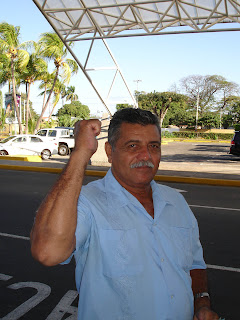Monday evening—three days ago--we hosted a party to thank
people who had worked for the Gateway to Hope Garden Tour, which funds arts
camps for Nicaraguan children.
Our evening activity was hand-thrown ice cream. We placed
milk, sugar, and vanilla in a quart Ziploc bag, inserted it into a gallon
Ziploc, surrounded the smaller bag with ice and rock salt, and then wrapped it
securely with sheets of Styrofoam. After 10 minutes of playing catch with this
package in the backyard, guests had made their own ice cream.
It was the eve of our departure for Nicaragua, and my
environmental conscience was in hyper-vigilant. Instead of disposables, I provided
glass bowls and metal spoons. When guests unwrapped their ice cream, we saved
the Styrofoam sheets.
Then, the final test: what to do with the Ziplocs? Was I
willing to wash and dry 30 of them? I sighed and heeded my conscience. “Perhaps it’s silly,” I
told Larry, who was helping with the party, “But, thinking of Nicaragua, I
simply cannot toss them.”When I carried the Ziplocs into the kitchen, four
friends were washing glasses, bowls, and spoons.
I joined them. But when I started to dry the first Ziploc,
Sandy sent me for a hanger and clips, telling me there was a better way.
Fast forward to our Nicaraguan guest house, where the
windows are forever open to the outdoors, the toothpick holder is a
reclaimed salt shaker, and the avocado on my plate is picked from the Hernandez
yard.
When I wash my hands in the bathroom sink, I think of the
one in my kitchen. Above it hang 30 Ziploc bags, ready for re-use.
And above this bathroom sink in Nicaragua, in respect for
North American guests perhaps, something new has replaced the familiar hand
towel--a paper towel dispenser.
A cross cultural exchange of sorts.
But not one I expected.



























